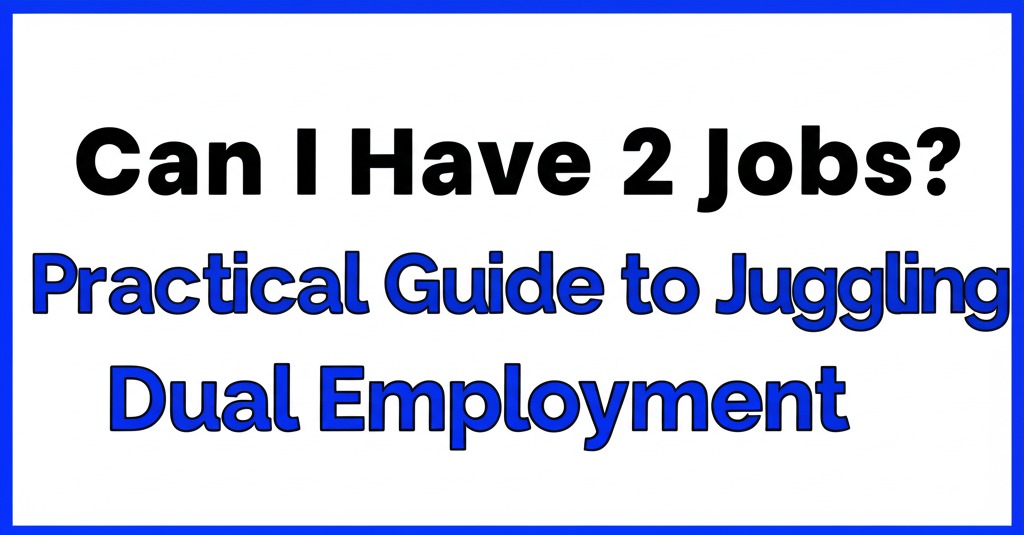
In today’s fast-paced, gig-driven economy, more people are asking the question: “Can I have 2 jobs?” Whether it’s for extra income, personal growth, or pursuing a passion, having multiple jobs is more common than ever. But with the potential benefits come challenges—time management, legal concerns, and maintaining work-life balance.
If you’re considering taking on a second job, this guide will walk you through everything you need to know—from legal considerations and financial perks to practical tips on managing both roles successfully.
Is It Legal to Have Two Jobs?
Know Your Employment Contract
Before you dive into a second job, check the fine print on your current employment contract. Some employers have non-compete clauses or conflict of interest policies that may restrict you from working for another company, especially within the same industry.
At-Will Employment and Your Rights
In most U.S. states, employment is “at-will,” which means you can technically hold multiple jobs unless explicitly forbidden. However, failing to disclose relevant information to your primary employer could lead to trust issues—or worse, termination.
Why People Choose to Work Two Jobs
There are plenty of reasons someone might choose dual employment, including:
- Increasing income to pay off debt, save for a goal, or manage rising living costs
- Gaining experience in a new field or building a more diverse skill set
- Pursuing a passion project or side hustle that might eventually become a full-time career
- Job security, especially if one job is freelance or contract-based
If any of these reasons resonate with you, a second job might be worth considering.
The Pros and Cons of Having Two Jobs
Benefits of Dual Employment
Having two jobs can be empowering—financially and professionally. Here are some advantages:
- Extra income to boost savings or reach financial goals faster
- Skill development across different industries
- Networking opportunities in various professional circles
- Job flexibility, especially with remote or freelance work options
Challenges You Might Face
On the flip side, holding two jobs comes with its own set of hurdles:
- Burnout and fatigue from juggling long hours
- Limited free time, affecting social life and personal commitments
- Scheduling conflicts or overlapping duties
- Tax complications, especially when managing multiple income sources
How to Successfully Manage Two Jobs
Balancing two jobs doesn’t have to be overwhelming—if you plan strategically. Here are some practical tips to stay on top of your dual roles:
1. Prioritize Time Management
Use a calendar or productivity app to map out your work hours, deadlines, and rest periods. Establish boundaries and make sure you have enough downtime to recharge.
2. Choose Compatible Roles
Ideally, pick jobs that complement each other in terms of schedule and workload. For example, you could combine a 9–5 office job with a flexible freelance gig in the evenings or weekends.
3. Communicate Openly
If needed, be honest with your employers—especially if your second job might occasionally affect your availability. Transparency helps build trust and prevents future conflicts.
4. Take Care of Your Health
When working two jobs, it’s easy to neglect self-care. Prioritize sleep, nutrition, and mental well-being. Burnout is real, and your health should always come first.
5. Stay Organized Financially
Track your income, set aside money for taxes (if you’re freelancing), and avoid lifestyle inflation. Multiple income streams can lead to better financial stability—but only if managed wisely.
Can You Work Two Remote Jobs?
With the rise of remote work, more people are exploring “double-remote” employment. While it’s technically possible, keep these key points in mind:
- Avoid overlapping work hours
- Make sure you can meet deadlines and expectations for both roles
- Never use one employer’s resources (like a laptop or software) for another job
- Be cautious about conflicting interests or violating company policies
Ethics and transparency are essential when working remotely for two employers simultaneously.
Tax and Financial Considerations
Working multiple jobs can complicate your tax situation. Here’s what to be aware of:
- You may enter a higher tax bracket, depending on total income
- Each employer withholds taxes based on your W-4, which could result in underpayment
- Consider consulting a tax advisor or using tax software to ensure compliance
Also, don’t forget about 401(k) or retirement plan limitations—you may not be able to max out contributions across two employers.
When Two Jobs Might Not Be a Good Idea
Sometimes, more isn’t better. You might want to reconsider taking on a second job if:
- Your primary job is already demanding and stressful
- You have significant personal or family responsibilities
- You struggle with time management or burnout
- You have health issues that could worsen with added pressure
Listen to your body and mind. If the cost outweighs the benefit, it’s okay to stick with one job and find other ways to achieve your goals.
Final Thoughts: Should You Get a Second Job?
So, can you have two jobs? Absolutely. But should you? That depends on your circumstances, goals, and ability to manage the workload.
If you’re motivated, organized, and clear on your purpose, dual employment can be a smart move—financially and professionally. Just make sure you’re not sacrificing your health or long-term well-being in the process.

Andre Cuevas provides career insights, job search strategies, and professional advice to help individuals navigate the job market and achieve their career goals.





